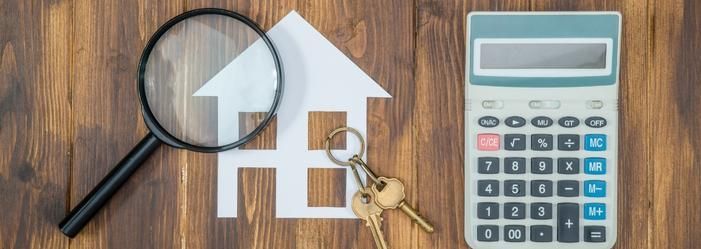Last Updated: March 19, 2024
Figure Out Exactly How Much House You Can Afford

Disclaimer: We are not qualified legal or tax professionals and are not giving advice. Always speak with a qualified professional before making any legal or financial decisions.
Starting on the journey hinges on understanding how much house fits within your budget. In today's ever-changing real estate market, knowing your financial capacity is more important than ever.
This complete guide is designed to help you through the essential steps and considerations for accurately calculating your home buying budget. By assessing your financial landscape and exploring various mortgage options, we aim to empower you with the knowledge to make a wise and sustainable investment in your future home.
Whether you're a first-time buyer or looking to upgrade, join us as we tackle the process of determining how much house you can truly afford.
Don't want to read through? Speak to a debt specialist right now.
Calculate your monthly budget and how much you can afford to spend on a mortgage
To calculate your budget, start by adding up all of your monthly expenses. This should include everything from groceries and utilities to car payments and insurance. Once you have a total, subtract this amount from your monthly income. The amount that's leftover is what you can afford to spend on a mortgage.
Keep in mind that your actual mortgage payment will be higher than this figure, as it will also include things like interest and property taxes. But this calculation can give you a general idea of how much you can afford to borrow.
Start by looking at your monthly income and expenses. Make a list of all your sources of income, including your paycheck, any investments or rental property income, child support, or alimony. Then, list out your fixed expenses like rent or mortgage payments, car payments, student loan payments, and insurance premiums.
Once you have these numbers, subtract your monthly expenses from your monthly income. This will give you how much money is left over each month to put towards a mortgage payment. Multiply this number by 36 to get an idea of how much house you can afford per year.
Estimate your down payment amount and closing costs
Your down payment amount and closing costs will vary depending on the purchase price of the home, your mortgage lender, and the location of the home. In general, you can expect to pay between 3% and 20% of the purchase price as a down payment, and closing costs will typically range from 2% to 5% of the purchase price. Your mortgage lender can give you a more accurate estimate based on your individual circumstances.
Once you know how much you can afford to spend on a home, it's important to factor in other costs associated with homeownership. Gain a deeper understanding of these expenses by reading our complete guide to the true cost of home ownership.These costs may include property taxes, homeowners insurance, and HOA fees (if applicable).
You should also budget for regular maintenance and repairs, which can vary depending on the age and condition of your home.
Determine the maximum monthly payment you can comfortably afford
To determine the maximum monthly payment you can comfortably afford, use a budgeting tool or spreadsheet to track your income and expenses for at least a month.
Once you have an accurate picture of your spending, subtract all of your regular recurring expenses (e.g., rent, utility bills, car payments, etc.) from your monthly take-home pay. This will give you the amount of money you have left each month to put towards debt repayment or other savings goals.
For example, if you have a total monthly debt payment of $1,500 and a total monthly income of $6,000, your debt-to-income ratio would be 25%. This means that 25% of your monthly income goes towards debt payments.
So based on this information, the maximum monthly payment you could comfortably afford would be $1,500. Remember, this is just a general guideline and your own personal finances may vary.
Research different types of mortgages available to you
When you're shopping for a mortgage, it's important to understand the different types of mortgages available to you. The most common type of mortgage is the fixed-rate mortgage, which offers a fixed interest rate and monthly payment for the life of the loan.
Another common type of mortgage is the adjustable-rate mortgage (ARM), which offers a lower initial interest rate than a fixed-rate mortgage. However, the interest rate on an ARM can rise or fall over time, depending on prevailing interest rates.
There are also several specialized types of mortgages available, including reverse mortgages, jumbo mortgages, and foreign national mortgages. So be sure to research all your mortgage options before choosing one.
Here are a variety of mortgages available to you, depending on your needs and eligibility.
Some of the most common types of mortgages include:
- Fixed rate mortgage: A fixed-rate mortgage has a set interest rate that will not change for the duration of the loan. This is a good option if you want predictability and stability in your monthly payments.
- An
adjustable-rate mortgage (ARM): An ARM has an interest rate that can change at regular intervals, usually every few years. This type of mortgage can be a good option if you think rates will go down in the future, as your payments could decrease as well. However, it's important to be aware that ARMs can also have much higher rates than fixed-rate mortgages, so be sure to read the terms of your loan agreement carefully.
- FHA mortgage: An FHA mortgage is a government-backed loan that requires smaller down payments and has more relaxed credit requirements than other mortgages. This type of loan can be a good option for first-time homebuyers or those with less money saved up for a down payment. This type of loan can be a good option for first-time homebuyers or those with less money saved up for a down payment. For additional support, explore these
first-time homebuyer assistance programs.
- VA mortgage: A VA mortgage is a loan backed by the U.S. Department of Veterans Affairs, and is available to veterans and active military personnel. This type of loan offers competitive interest rates, no down payment requirement, and other benefits such as allowance for closing costs.
Ask questions about the loan process to make sure you understand everything
Always make sure you ask questions about the loan company and how their loan process works. You really should understand the entire process before signing any paperwork.
Remember that you don't have to use the first mortgage company that you come across. Comparison shopping is key in order to find the best deal on a home loan. And once you've found the right company, take your time in filling out their application, you want to make sure everything is correct so there are no mistakes.
Examples of some questions you may want to ask when getting a loan:
- What documentation is required to apply for a loan?
- When will I know if I've been approved for a loan?
- What interest rates can I expect on a personal loan?
- How do I repay my loan?
- Can I get a loan if I have bad credit?
You will likely need your Social Security number, your driver's license number, proof of income, and recent bank statements to apply for a personal loan. Your lender will let you know if you've been approved and what the interest rate will be.
Most loans are repaid through monthly installments. You can improve your chances of being approved for a personal loan by having good credit.
Choose the right home for your needs and budget
There are a few things to consider when choosing the right home for you and your budget. First, think about what is important to you in a home. Do you need lots of space, or are you happy with a smaller, more manageable space? Is outdoor important to you, or do you prefer an urban environment?
Once you know what is important to you in a home, start looking at different neighborhoods that fit your needs. It's important to find a neighborhood that is safe and that has good schools if you have children. You should also research the cost of living in different neighborhoods because some areas may be more expensive than others.
Finally, look at different types of homes within those neighborhoods and see what fits your budget. Keep in mind that you don't have to buy the biggest, most expensive home in a neighborhood - there are many homes available at different price points.
Once you've done all your research, it's time to start house hunting! Make sure to take advantage of online tools like Trulia and Zillow, which can give you a good idea of how much homes are selling for in different neighborhoods.
Use Online Mortgage Calculators

Online mortgage calculators are a useful tool to estimate your potential monthly payments under different scenarios. By adjusting factors like the down payment amount, mortgage interest rate, home price, taxes, insurance, and loan term, you can get an idea of how these variables impact affordability.
For example, you could see how raising your down payment from 10% to 20% on a $300,000 home reduces the monthly payment by decreasing the amount borrowed. Or you could compare payments for a 30-year fixed-rate loan versus a 15-year fixed-rate loan to see how the shorter term saves significantly on interest charges.
Playing around with an online mortgage calculator using realistic inputs allows you to determine price ranges and monthly payments you feel comfortable with before even consulting a lender. Being able to visualize affordability under different conditions gives you greater confidence when you do apply for a mortgage.
Popular and easy-to-use options include calculators from Nerdwallet, Bankrate, and Zillow. Spend time experimenting to find your affordability sweet spot.
Work With a Real Estate Agent
Partnering with an experienced real estate agent is invaluable when determining how much home you can afford. Agents have access to MLS listings of homes for sale and can run comps of recently sold similar properties to help estimate market values in the neighborhoods you're considering.
Leverage your agent's market expertise to only be shown homes strictly within your pre-approved price range and loan amount. They can provide an objective view on whether a potential property is priced appropriately or if a bidding war could drive it out of reach.
Your agent's deep understanding of the local real estate landscape helps ensure you don't overpay while still landing your dream home. Allow them to guide you on making offers that protect affordability now and in the future.
Factor in Additional Costs of Homeownership
When creating your homebuying budget, look beyond just the mortgage payment itself. You also need to account for property taxes, homeowners insurance, HOA fees (if applicable), maintenance, repairs, and utilities.
Get quotes from insurance agents on rates for homes in your desired areas. Research local property tax rates - your agent can help provide estimates as well. Budget 1-3% of the home's value annually for maintenance and repairs based on factors like age and size.
Tracking all these additional costs ensures your complete monthly and yearly housing expenses align with your affordable thresholds. You don't want to be caught off guard once you become a homeowner.
Look at Different Payment Scenarios
Online mortgage calculators allow you to see how adjusting certain factors impacts your estimated monthly payment. Take the time to look at different down payment amounts, mortgage terms, interest rates, home prices, taxes, insurance, etc.
For example, compare the payment difference between putting 10% down versus 20% down while keeping other factors equal. Or see how a 30-year fixed mortgage payment compares to a 15-year fixed mortgage. Look at different home prices while maintaining the same down payment percentage.
Evaluating multiple scenarios helps you understand the trade-offs to make the most informed financial decision. A larger down payment gives you equity faster but also requires having more cash upfront. A shorter mortgage term costs more per month but saves substantially on interest paid over the lifetime of the loan.
Consider Future Plans
When evaluating home affordability, it's important to think beyond just your current situation. Consider your future financial needs and potential life changes as well over the next several years.
Are you planning to start a family and need to budget for childcare costs? Do you expect career advancement that will require saving more for retirement? Might you need to relocate for new jobs or family obligations?
Build enough cushion into your homebuying budget to allow for these possible lifestyle shifts. Don't buy at the very top of your pre-approved amount if it could jeopardize financial flexibility later. Aim a little below your max to prepare for unknowns ahead.
Work on Improving Your Credit Score
The stronger your credit score, the larger the mortgage amount and better interest rate a lender may approve you for. If your credit needs work, allow at least 6 months before buying to improve your score.
Pay all bills on time going forward, eliminate outstanding collection accounts if possible, and dispute any errors on your credit report. Reducing balances on credit cards and loans also helps. Meeting with a credit counselor could provide guidance on boosting your score quickly and responsibly.
A difference of even 50 points on your credit score could potentially save thousands in interest or enable approval for tens of thousands more in lending. The effort to improve your credit can really pay dividends via increased home purchasing power.
Checklist Before Buying
- Get pre-approved for a loan - Submit financial documents and get qualified for a mortgage amount/rate
- Research mortgage programs - Explore specialized options like FHA, VA, USDA loans to find the best fit
- Consult a real estate agent - Utilize their expertise throughout the homebuying process
- Use online mortgage calculators - Estimate payments by adjusting different home/loan factors
- Stay within your budget - Stick to price range you pre-qualified for and got pre-approved within
- Get home inspections - Thoroughly inspect potential homes to identify any major defects
- Examine your total monthly expenses - Ensure you can afford the complete cost of homeownership
- Read all disclosures - Carefully review loan docs and contracts so you fully understand terms
- Build emergency savings - Have 3-6 months of mortgage payments banked as a safety net
- Evaluate insurance needs - Research rates for homeowners, flood, earthquake coverage as needed
- Complete a final walkthrough - Do one last check of property before closing to spot any changes
Having this checklist can help ensure major steps are not missed during what can be an emotionally-driven and rushed process. Following it sets you up for success in purchasing a home you can comfortably afford now and in the future.
FAQs
Conclusion
So, how much house can you afford? It’s important to remember that your mortgage payment should not be more than 30% of your income. You also need to factor in other monthly expenses and debts.
But by using a home affordability calculator and considering all of the factors involved, you can get a good idea of what price range is comfortable for you. And when it comes time to buy, remember to stay within your budget!
Consulting a trusted real estate agent and using comprehensive affordability calculators that account for all costs also helps you pick the ideal home within your budget. Considering all financial factors with a cushion gives you security knowing you can comfortably afford the home.
If you are struggling with overwhelming debt and want to explore your debt relief options, Pacific Debt Relief offers a free consultation to assess your financial situation. Our debt specialists can provide objective guidance relevant information and support to help find the right debt relief solution.
*Disclaimer: Pacific Debt Relief explicitly states that it is not a credit repair organization, and its program does not aim to improve individuals' credit scores. The information provided here is intended solely for educational purposes, aiding consumers in making informed decisions regarding credit and debt matters. The content does not constitute legal or financial advice. Pacific Debt Relief strongly advises individuals to seek the counsel of qualified professionals before undertaking any legal or financial actions.
✔ Accredited by Better Business Bureau with BBB A+ rating (4.92 rating and 1,700+ reviews)
✔ 7.5 star rating by BestCompany.com (over 2300+ client reviews)
✔ 4.8 star rating by TrustPilot (over 2200+ verified consumer reviews)
✔ ConsumerAffairs.com Accredited (over 500+ verified reviews with an average rating of 5 stars)
✔ A Top 10 Rated Compan by TopTenReviews.com , ConsumersAdvocate.com and Top10debtconsolidation.com
✔ 4.6 star rating by Google (400+ client reviews)
✔ 100% rating by SuperMoney (8 client reviews)
Reduce Your Credit Card Debt By Up to Half

BBB Reviews | 4.9/5.0 Rating









 Do Not Sell My Personal Information
Do Not Sell My Personal Information